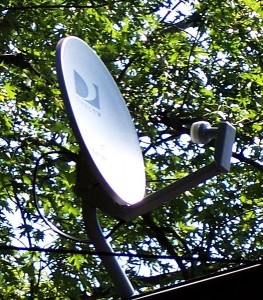TRB edges closer to fully regulating satellite TV carriers


Direct broadcast satellite service providers, such as DirecTV, will have to abide by the TRB’s rules for the sector. (Credit: Wikipedia)
More than 18 months after getting the legal go-ahead to include satellite television companies within its jurisdiction, the Puerto Rico Telecommunications Regulatory Board is moving closer to implementing the regulations that companies will be required to follow.
The proposed regulations, which the agency posted on its website, establish that all companies providing direct broadcast satellite (DBS) services to customers in Puerto Rico must register at the agency before launching.
By taking jurisdiction over those companies, the TRB seeks to regulate the terms and conditions of services agreements, and decide on customer complaints regarding agreements or services and any matter that is not specifically preempted by federal law.
As part of its administrative duties, the TRB will require satellite service providers to submit copies of their service agreements, which must disclose all charges and offers, opt-in-only renewal for customers, free equipment insurance for six months and credit for service interruptions, among others.
Furthermore, satellite providers must complete equipment repairs and service restoration must within reasonable time periods.
At present, there are three DBS companies providing services to Puerto Rico consumers: DirecTV, Dish Network and Claro de Puerto Rico’s ClaroTV service. Those companies compete head-on with Liberty Cablevision — which completed its acquisition of OneLink Communications just last week — and Choice Cable in Ponce.
The 21-page proposed regulation also addresses the fines that satellite service providers face for failing to comply with the agency’s dispositions. Under the Puerto Rico Telecommunications Act, each violation can carry fines of up to $25,000. Furthermore, the TRB also has the legal authority to adjudicate class actions and award damages of up to $5 million in such cases.
“It is our opinion that some of the provisions of Law 11 and of the proposed regulation may be preempted by federal law, and therefore unconstitutional. In first instance, the Federal Communications Commission is the entity that grants licenses to provide DBS services, thus any complaints regarding programing, signal or service quality should be reserved to federal jurisdiction,” said attorney Gladys Maldonado-Rodríguez, of Maldonado & Toro Consulting Group.
“Companies should actively participate in these rulemaking procedures and share their expertise with administrative agencies in order to avoid the adoption of arbitrary or illegal rules before they are enacted,” she said.
“Excessive and unnecessary regulation, far from benefiting consumers, hinders economic investment and deters the implementation of innovative technology, and the increased cost of regulatory compliance is ultimately borne by clients,” Maldonado-Rodríguez concluded.
Interested parties have until December 5, 2012 to submit comments to the proposed regulation, prior to its submission at the Puerto State Department.














